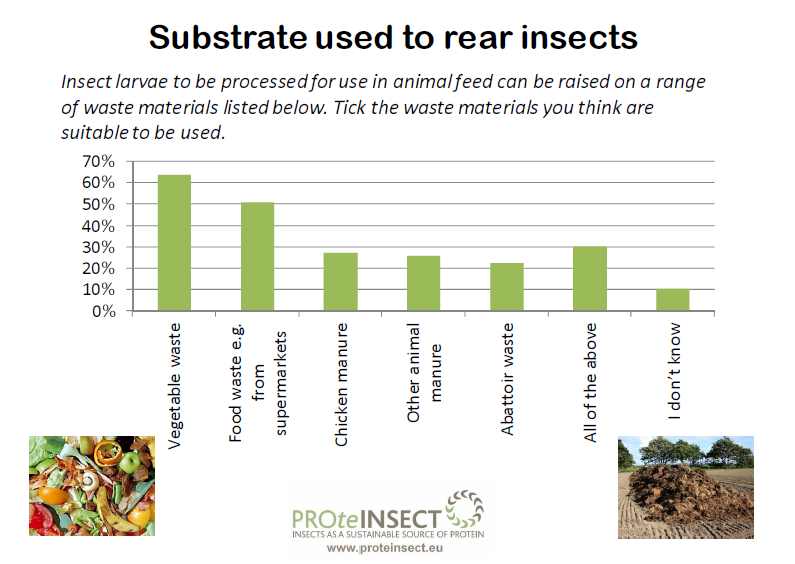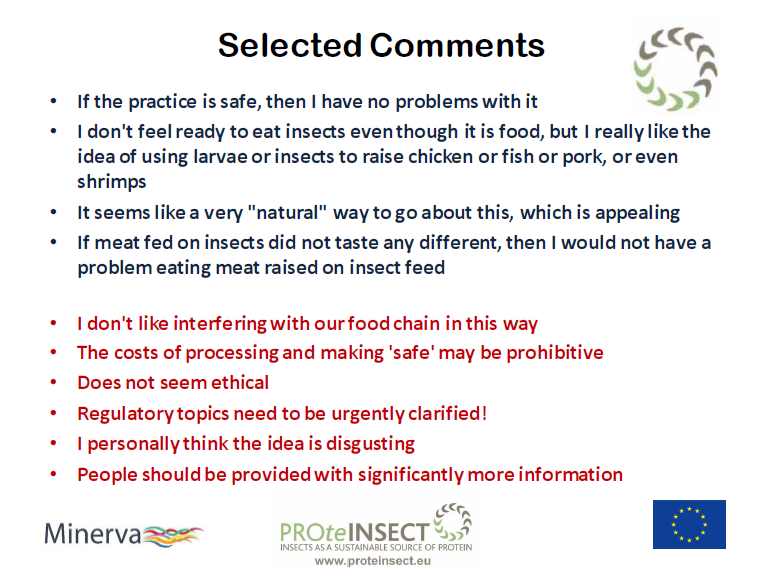- Resource recovery
- Production of insect biomass from excreta or organic waste
- Edible insects - Future prospects for food and feed security? Black Soldier Fly research issues
Edible insects - Future prospects for food and feed security? Black Soldier Fly research issues
38.3k views
- joeturner
-
 Less
Less- Posts: 717
- Karma: 23
- Likes received: 185
Re: Black soldier fly larvae (BSFL): productive sanitation, faecal sludge management - and conference "Insects to feed the world"
JKMakowka wrote:
You are right though that there might be a niche in landlocked countries like Uganda with some domestic aquaculture. However the profitability of it is very low, especially if you can't export due to EU regulations.
I asked the representatives from the European Commission about that as well. They said that they had no jurisdiction as to how fish farmers in Africa feed their fish for export.
Again, I think the problem might be more to do with the supermarket buyers of fish being uncomfortable with the idea of the fish being fed something which would be illegal in the EU than with any actual legal problem.
I asked a few different people and got different answers about the legal situation, but I think that the answer from the EU representative is most likely to be correct.
Please Log in to join the conversation.
You need to login to replyRe: Black soldier fly larvae (BSFL): productive sanitation, faecal sludge management - and conference "Insects to feed the world"
You are right though that there might be a niche in landlocked countries like Uganda with some domestic aquaculture. However the profitability of it is very low, especially if you can't export due to EU regulations.
Please Log in to join the conversation.
You need to login to reply- joeturner
-
 Less
Less- Posts: 717
- Karma: 23
- Likes received: 185
Re: Black soldier fly larvae (BSFL): productive sanitation, faecal sludge management - and conference "Insects to feed the world"
Please Log in to join the conversation.
You need to login to reply- joeturner
-
 Less
Less- Posts: 717
- Karma: 23
- Likes received: 185
Re: Black soldier fly larvae (BSFL): productive sanitation, faecal sludge management - and conference "Insects to feed the world"
JKMakowka wrote: Thanks for posting all these details.
My "take home" message is that we can't really expect a large scale BSF industry uptake in the sanitation sector.
In the agricultural sector it is however not exactly new, and the renewed interest seems to be mainly driven by various issues around fish-meal (mainly an expected increase in prices). Given recent innovations in genetically modified soy protein for animal feeds it will likely stay an niche market though.
I don't know about this. The moves into agriculture certainly are new, because the volumes and processes you need to grow the amounts of BSFL (and crickets, common housefly etc) to produce enough for use in animal feeds are new.
Insect protein has a lot of advantages over soya (including the amount of land you need, the digestibility of the protein, the amount of energy input needed, the ability to produce insects close to the market, etc).
But even if it has no impact on the use of soya, the use of fishmeal in animal feed is massive, so the potential for insects to replace fishmeal (which, as you say, has a lot of problems) is large.
Perhaps I am too close to it, but having spoken to a lot of people involved in the insect production industry I would say that the space for expansion is massive. If the regulatory issues can be resolved in the EU and the USA, I think there is every chance that insectmeal could become a globalised commodity product at least as big as fishmeal is today.
And even if those issues take a long time to resolve, insectmeal is already being used in countries where there are no regulatory issues, such as in South Africa. In your context, I think the chances of seeing Ugandan fish farmers using feed based on insects in the relatively near future are high. The real question is not so much whether they will be using insects but where they will be getting them from.
So the real question (for us) is: how can BSF benefit smaller scale applications for subsistence farmers or similar where most of the "industry" issues do not apply?
Yes I specifically asked this question to researchers working in the field - what is the chance of BSFL being used widely in sanitation. They all said no chance at all, because the management and supervision of the process was too complex to be seen on a subsistance farmer level. Like many other technologies, I think the only way that this would work would be to have a community-level production facility, and it is not clear how big this would have to be to produce a useful amount of BSFL.
Agriprotein of South Africa, which seems to have done most basic research on the processes of mass producing BSFL, is in partnership in a sanitation project called The Biocycle: www.thebiocycle.com/ - which may have been mentioned before here.
I especially wonder if it is possible to somehow package and store BSF eggs cheaply to make them available more easily to anyone interested in trying, i.e. lowering the entry barrier for uptake.
Edit: seems like something like that exists: blacksoldierflyblog.com/bsf-egg-starter-kit/ (but it is not "storable")
I think the egg production is one of the major stumbling blocks, together with how to distribute them from a central facility to dispersed units.
It is true that there are enthusiasts who are blogging information about the use of BSFL on a microscale, but they appear to be mostly blogging from a western perspective - where they have access to a lot of materials and inputs etc. I am not clear how easily this could be transported to a situation where those materials are not so readily available.
Please Log in to join the conversation.
You need to login to replyRe: Black soldier fly larvae (BSFL): productive sanitation, faecal sludge management - and conference "Insects to feed the world"
blacksoldierflyblog.com/GMap/BSFmap.html
blacksoldierflyblog.com/forum/viewtopic.php?f=17&t=75
Edit: from a quick glance this site also seems interesting:
www.blacksoldierflyfarming.com/
Please Log in to join the conversation.
You need to login to replyRe: Black soldier fly larvae (BSFL): productive sanitation, faecal sludge management - and conference "Insects to feed the world"
My "take home" message is that we can't really expect a large scale BSF industry uptake in the sanitation sector.
In the agricultural sector it is however not exactly new, and the renewed interest seems to be mainly driven by various issues around fish-meal (mainly an expected increase in prices). Given recent innovations in genetically modified soy protein for animal feeds it will likely stay an niche market though.
So the real question (for us) is: how can BSF benefit smaller scale applications for subsistence farmers or similar where most of the "industry" issues do not apply?
I especially wonder if it is possible to somehow package and store BSF eggs cheaply to make them available more easily to anyone interested in trying, i.e. lowering the entry barrier for uptake.
Edit: seems like something like that exists: blacksoldierflyblog.com/bsf-egg-starter-kit/ (but it is not "storable")
Please Log in to join the conversation.
You need to login to reply- Elisabeth
-
Topic Author
- User is blocked
- Freelance consultant since 2012
Less- Posts: 3372
- Karma: 54
- Likes received: 932
Re: Black soldier fly larvae (BSFL): productive sanitation, faecal sludge management - and conference "Insects to feed the world"
The EU research project Proteinsect which was mentioned several times in these threads on black solider fly larvae have now shared on their website their conference presentationsa at the above mentioned conference "Insects to Feed the World" in Ede, the Netherlands in May 2014: www.proteinsect.eu/index.php?id=35
(thanks to Joe for bringing this conference to our attention! Thanks for the interview with Stefan Diener as well, I really enjoyed listening to it; hang on, I somehow missed your blog post, Joe - excellent piece, summing up all the issues very well, with nice visuals!: medium.com/@bucksci/the-scientific-inter...utsider-49a8886ba0e2)
On the Proteinsect website you find their conference report as well as a zip fill with six presentations that they made.
I browsed through some of them and found they were very interesting. The bottom line seems to be that human faeces is not something people want to feed to these larvae but pretty much any other type of organic waste (including animal manure) seems to be less sensitive. As sanitation also includes solid waste issues, I think it is still of relevance here even if human excreta is for whatever reason currently not on the list of things to be fed to these larvae.
I copy here two slides from the first presentation listed below:
The six presentations of Proteinsect team members had the following titles:
- Do European citizens accept the use of insects for animal feed & human food?
- Promoting Legislation Change to Help Feed the World
- Generic Life Cycle Assessment of proteins from insects
- Safety and quality considerations of insects for feed and food
- Prospects and constraints for the use of insects as human food and animal feed in West Africa
- Evaluation and improvement of a house fly larvae production system in Mali
www.proteinsect.eu/index.php?id=35
Or see attached below.
There is really a wealth of knowledge here, thanks for sharing, Proteinsect team!
Let me also highlight here again Joe's blog post about the conference that he attended (medium.com/@bucksci/the-scientific-inter...utsider-49a8886ba0e2) - very well put together!
Here are some quotes from Joe Turner's blog post which resonated with me:
What the insects eat
Finally we come to the area of most controversy amongst researchers in edible insects — namely what farmed insects should be fed. On the one side you have those who say that insects are not like other types of farmed animal in that they naturally eat things which other species do not eat. Things that could, potentially, include problematic organic wastes. The insects can eat it, they can grow and feed other animals in the process helping us with the waste problems.
Others say no, there are just too many problems with the idea of asking people to eat chicken which has eaten insects which has eaten manure. Or even, whisper it quietly, human faeces.
[...]
If the insects are properly maintained, if the systems are properly monitored and if both larvae and faecal wastes receive post-treatment, it is possible that BSFL could represent a step forward in terms of sanitation. But, according to everyone I spoke to about this, the idea that BSFL could be used as a widespread replacement for sanitation systems in latrines around the world is an idea which is not going anywhere.
[...]
Insects to feed the world?
At this conference I learned that there are many different people involved in talking about insects as food, many different scientists looking at different aspects, entrepreneurs, regulators and others. Many want to believe that insects will be a much bigger part of human diets in the future.
But can they? Will the Europeans ever get over their screamishness about insects and their labyrinthine animal feed rules? Will anyone want to live next to a large insect facility producing the quantities needed to make a meaningful difference? Is the indigenous food knowledge about insects from so many parts of the world under threat of exploitation by multinationals who want to take and use it for profit?
If I was to guess, I would think the mass farming of insects would be something that will never happen, a pipe-dream which looks good on paper but will never get the scale needed to make a difference. I think that if Europeans are worried about eating horse, which has very little proven health risk, they are not going to stomach insects anywhere in the food chain, particularly if the insects have been eating undesirable wastes. So I can imagine that insects will grow as a food source for the hungry and poor, for people who cannot afford anything better. Which, I think, would be a great shame.
Regards,
Elisabeth
Freelance consultant on environmental and climate projects
Attachments:
-
 survey1.jpg
(Filesize: 40KB)
survey1.jpg
(Filesize: 40KB)
-
 survey2.jpg
(Filesize: 49KB)
survey2.jpg
(Filesize: 49KB)
Please Log in to join the conversation.
You need to login to reply- joeturner
-
 Less
Less- Posts: 717
- Karma: 23
- Likes received: 185
Re: Black soldier fly larvae (BSFL): productive sanitation, faecal sludge management - and conference "Insects to feed the world"
(but, just to say, it isn't all about sanitation and BSFL!)
As I said, it will be also turning into a podcast soon.
Please Log in to join the conversation.
You need to login to reply- joeturner
-
 Less
Less- Posts: 717
- Karma: 23
- Likes received: 185
Re: Black soldier fly larvae (BSFL) as a product from productive sanitation and for faecal sludge management
For those who cannot listen to the podcast, the key points are:
1. Black soldier fly larvae were grown in sludge spiked with high levels of Salmonella and Ascaris helminths
2. Salmonella reduced dramatically, but there was not a corresponding destruction of Ascaris - but there was some indication that the BSFL was affecting the Ascaris activity.
3. Stefan Diener said that BSFL may not be appropriate for small dispersed communities.
I don't think it was mentioned here, but at the presentation it was stated that Ascaris was found inside the BSFL.
There were a lot of different groups working on BSFL and other insects as animal feed at the conference - most researchers believe that the processing of them reduces the risks of microbial pathogen transfer.
I am working on writing a longer piece about the conference and the above audio will eventually form part of a longer podcast about insects in animal feed.
++++++++++
Note by moderator (EvM):
The conference that Joe referred to was called: Insects to feed the world and took place in Ede, The Netherlands:
www.wageningenur.nl/en/show/Insects-to-feed-the-world.htm
See also here:
www.siani.se/event/insects-feed-world/may-2014
and
www.siani.se/news/entomophagy-environmen...ay-insect-conference
Lots of tweets were made, look on Twitter for the hashtag #insects2014 or see their twitter account: twitter.com/insects2014
Please Log in to join the conversation.
You need to login to reply- OfosuBudu
-
- A professor at the University of Ghana, Forest and Horticultural Crops Research Centre, Legon, Accra Ghana. Research into recycling of organic waste (agricultural and municipal) to compost and biochar for improving soil health and promoting good environm
Less- Posts: 2
- Likes received: 0
Re: Black soldier fly for sanitation
Ofosu-Budu
Please Log in to join the conversation.
You need to login to reply- Robert7
-

- I am Robert Impraim, a Junior Research Officer (Recycling and Reuse) with the International Water Management Institute (IWMI-Ghana).
Less- Posts: 4
- Likes received: 1
Re: Black soldier fly larvae (BSFL) as a product from productive sanitation and for faecal sludge management
Does any know of the use of the byproduct/leftover (or compost)from the BSFL for crop production (experimental)? How stable and matured (phytotoxicity) was this compost?
Does any one also have information on the pH and EC of the compost from BSFL.
In the usage of the BSFL as animal feed, any information of heavy metal or pathogen accumulation in those animals the BSFL was fed?
Robert.
Please Log in to join the conversation.
You need to login to reply- joeturner
-
 Less
Less- Posts: 717
- Karma: 23
- Likes received: 185
Re: Black soldier fly larvae (BSFL) as a product from productive sanitation and for faecal sludge management
I wonder how effective the suggestion of using the black soldier fly larvae followed by more conventional red worm vermiculture would be - regarding the break down of the pathogens.
Please Log in to join the conversation.
You need to login to reply- Resource recovery
- Production of insect biomass from excreta or organic waste
- Edible insects - Future prospects for food and feed security? Black Soldier Fly research issues








